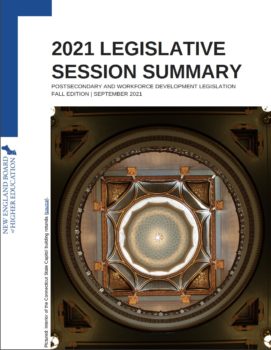Amid a lingering pandemic, a surprise merger proposal and strong efforts to make college free or debt-free, the 2021 legislative session in New England was one for the books.
Let’s take a look at some of the highlights of this year’s state legislative sessions …
Sexual misconduct and assault
Lawmakers in Connecticut and Massachusetts passed legislation focused on college campus safety, including bills (HB.6374, S.2979) that require postsecondary institutions to distribute a sexual misconduct survey to students. While Connecticut’s law requires campuses to distribute the survey every two years, the survey in Massachusetts must be issued every four years. A task force will be formed in Massachusetts to review the surveys.
College affordability
In May, the Rhode Island General Assembly made permanent the Rhode Island Promise program, which provides up to two years of free tuition for eligible Rhode Islanders at the Community College of Rhode Island. The legislation removed the sunset clause for the program, which had been set to expire with the high school graduating class of 2021. Data show that a significant number of Rhode Islanders had been taking advantage of the program; during the first two years of Rhode Island Promise, the state’s college-going rate increased from 59% to 67%.
In Connecticut, Rep. Gary Turco, who is a member of NEBHE’s Legislative Advisory Committee, introduced HB.5213, which would fully fund the state’s debt-free community college program. Tuition-free community college was permitted to continue in Connecticut in spring 2020 after the Board of Regents for Higher Education’s finance committee voted to borrow $3 million from reserves to fund the program for the upcoming semester. Lawmakers originally approved the tuition-free community college program in 2019 but did not allocate permanent funding for it. HB.5213 would establish a recurring funding stream for the program.
Vermont lawmakers continued to deliberate the future of Vermont state colleges. In the next legislative session, lawmakers plan to move the discussion forward by establishing an “affordability standard” to define what it means for college to be affordable.
Closures, mergers and acquisitions
In February, New Hampshire Gov. Chris Sununu surprised Granite Staters when he announced a plan to quickly merge the state’s community college and university systems under a single board of trustees. He contended that a merger of the 11 community colleges and four four-year institutions would not only save money, but also more importantly, create a more seamless pathway for students to move among the campuses. Lawmakers immediately expressed concern about the proposal, citing, among other issues, the governor’s unrealistically rapid timeline for the merger. During the legislative process, the House amended Sununu’s proposal, calling instead for the creation of a “New Hampshire Higher Education Merger Assessment Commission” with $1.5 million to study the idea and consider beginning implementation next year. The Senate shot down the House amendment, and Sen. Lou D’Allesandro, who is the former chair of NEBHE, proposed a new amendment that would create a commission of educators with knowledge of both systems and with a $5 million appropriation to provide what was needed to conduct a study. However, that idea never came to a vote.
In April, the Select Committee on the Future of the Vermont State College System released its final report. Prior to its release, the Vermont State College System (VSCS) Board of Trustees moved to adopt the Select Committee’s recommendation to consolidate Northern Vermont University, Castleton University, and Vermont Technical College into one administrative unit—to be renamed Vermont State University—starting July 1, 2023.
Additionally, during the most recent legislative session, the state funded a Degree Completion Scholarship that will cover tuition and fees for up to 30 credits in the 2021-22 academic year for Vermonters who have taken some college courses but have not earned a credential or degree. Vermont lawmakers also allocated state funds to provide free tuition to Vermont students enrolled in certain certificate and degree programs next year, including all VSC nursing and nursing pathway programs, the early childhood education programs, and the paramedicine program. Both funds are “last-dollar,” meaning they are applied after state and federal gift aid, such as the Vermont Grant and the federal Pell Grant. A full list of eligible programs is available at yourfuture.vsc.edu.
Additional legislation
When. Sununu signed SB.147 into law this year, New Hampshire became the first New England state to require high school graduates to complete the Free Application for Federal Student Aid (FAFSA). The new law’s implementation is aligned to concur with the release of a revised FAFSA application for the 2023-24 school year. A similar bill in Massachusetts (H.1367) is pending.
The Rhode Island General Assembly granted in-state tuition rates to all Rhode Islanders, regardless of immigration status, for the state’s public colleges and universities.
Maine addressed concerns about Covid-related learning loss with LD 325. The bill, signed into law in March, allows students whose access to on-site education is limited as a result of a state of emergency, such as that resulting from the Covid-19 pandemic, to be classified as having experienced education disruption and eligible for school work recognition plans that will demonstrate achievement under Maine’s system of learning results.
Stephanie M. Murphy is the associate director of policy research and analysis at NEBHE.
[ssba]

